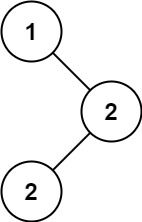Welcome to Subscribe On Youtube
501. Find Mode in Binary Search Tree
Description
Given the root of a binary search tree (BST) with duplicates, return all the mode(s) (i.e., the most frequently occurred element) in it.
If the tree has more than one mode, return them in any order.
Assume a BST is defined as follows:
- The left subtree of a node contains only nodes with keys less than or equal to the node's key.
- The right subtree of a node contains only nodes with keys greater than or equal to the node's key.
- Both the left and right subtrees must also be binary search trees.
Example 1:

Input: root = [1,null,2,2] Output: [2]
Example 2:
Input: root = [0] Output: [0]
Constraints:
- The number of nodes in the tree is in the range
[1, 104]. -105 <= Node.val <= 105
Follow up: Could you do that without using any extra space? (Assume that the implicit stack space incurred due to recursion does not count).
Solutions
-
/** * Definition for a binary tree node. * public class TreeNode { * int val; * TreeNode left; * TreeNode right; * TreeNode() {} * TreeNode(int val) { this.val = val; } * TreeNode(int val, TreeNode left, TreeNode right) { * this.val = val; * this.left = left; * this.right = right; * } * } */ class Solution { private int mx; private int cnt; private TreeNode prev; private List<Integer> res; public int[] findMode(TreeNode root) { res = new ArrayList<>(); dfs(root); int[] ans = new int[res.size()]; for (int i = 0; i < res.size(); ++i) { ans[i] = res.get(i); } return ans; } private void dfs(TreeNode root) { if (root == null) { return; } dfs(root.left); cnt = prev != null && prev.val == root.val ? cnt + 1 : 1; if (cnt > mx) { res = new ArrayList<>(Arrays.asList(root.val)); mx = cnt; } else if (cnt == mx) { res.add(root.val); } prev = root; dfs(root.right); } } -
/** * Definition for a binary tree node. * struct TreeNode { * int val; * TreeNode *left; * TreeNode *right; * TreeNode() : val(0), left(nullptr), right(nullptr) {} * TreeNode(int x) : val(x), left(nullptr), right(nullptr) {} * TreeNode(int x, TreeNode *left, TreeNode *right) : val(x), left(left), right(right) {} * }; */ class Solution { public: TreeNode* prev; int mx, cnt; vector<int> ans; vector<int> findMode(TreeNode* root) { dfs(root); return ans; } void dfs(TreeNode* root) { if (!root) return; dfs(root->left); cnt = prev != nullptr && prev->val == root->val ? cnt + 1 : 1; if (cnt > mx) { ans.clear(); ans.push_back(root->val); mx = cnt; } else if (cnt == mx) ans.push_back(root->val); prev = root; dfs(root->right); } }; -
# Definition for a binary tree node. # class TreeNode: # def __init__(self, val=0, left=None, right=None): # self.val = val # self.left = left # self.right = right class Solution: def findMode(self, root: TreeNode) -> List[int]: def dfs(root): if root is None: return nonlocal mx, prev, ans, cnt dfs(root.left) cnt = cnt + 1 if prev == root.val else 1 if cnt > mx: ans = [root.val] mx = cnt elif cnt == mx: ans.append(root.val) prev = root.val dfs(root.right) prev = None mx = cnt = 0 ans = [] dfs(root) return ans -
/** * Definition for a binary tree node. * type TreeNode struct { * Val int * Left *TreeNode * Right *TreeNode * } */ func findMode(root *TreeNode) []int { mx, cnt := 0, 0 var prev *TreeNode var ans []int var dfs func(root *TreeNode) dfs = func(root *TreeNode) { if root == nil { return } dfs(root.Left) if prev != nil && prev.Val == root.Val { cnt++ } else { cnt = 1 } if cnt > mx { ans = []int{root.Val} mx = cnt } else if cnt == mx { ans = append(ans, root.Val) } prev = root dfs(root.Right) } dfs(root) return ans } -
public class Solution { private int mx; private int cnt; private TreeNode prev; private List<int> res; public int[] FindMode(TreeNode root) { res = new List<int>(); Dfs(root); int[] ans = new int[res.Count]; for (int i = 0; i < res.Count; ++i) { ans[i] = res[i]; } return ans; } private void Dfs(TreeNode root) { if (root == null) { return; } Dfs(root.left); cnt = prev != null && prev.val == root.val ? cnt + 1 : 1; if (cnt > mx) { res = new List<int>(new int[] { root.val }); mx = cnt; } else if (cnt == mx) { res.Add(root.val); } prev = root; Dfs(root.right); } }